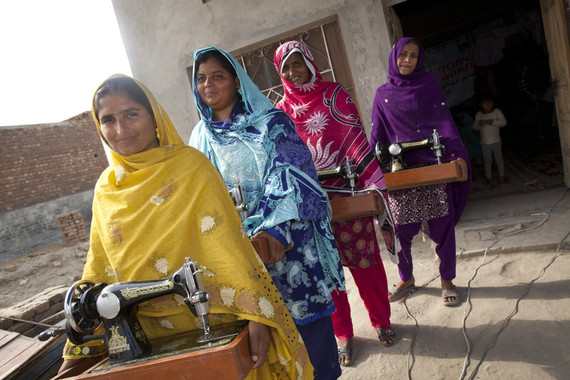Inequalities in global wealth distribution have never been greater, and innovative approaches are needed to achieve step-change. Just 8 people control more global wealth than the 3.6bn people who make up the poorest half of the world's population, and nearly 25% of the 1.6 billion Muslims globally live in extreme poverty.
In addition, the scale of the Syrian refugee crises is demanding new approaches to hosting refugees and supporting their long-term resilience and ability to pursue independent livelihoods. As most of the global refugee population is from Muslim majority countries, faith-sensitive solutions need to be considered for measures including the provision of work permits, business ownership rights, access to finance, and regional job creation strategies.
The principles behind Islamic finance, such as the right for all people to enjoy a minimum standard of living, and ethical limitations to what is in the public interest, have the potential to help address many of the underlying causes of global inequity. These principles are at the heart of practices like Waqf (a type of endowment) and Zakat (which requires eligible Muslims to give 2.5% of their wealth to charitable causes annually), and are central to Islamic Relief's programmes and microfinance initiatives to support those most in need.
In Jordan, the Islamic Relief Waqf is providing sustainable financing for the delivery of assistance to Syrian refugees while supporting host communities. The main impact of the project is to enable vulnerable Syrians to deal with life challenges and become independent. In addition to building trust between refugees and their host communities, economic interventions will be used to create improved community cohesion.
We believe that Islamic finance should not be seen as an alternative source of finance but rather an alternative way of doing finance. To effectively leverage Islamic finance approaches, however, strong links between the formal financial sector and communities is crucial, as well as robust, accountable, and transparent institutions at all levels (local, national, regional and global).
The governments of Malaysia, Singapore and Indonesia have been the most innovative in trying to formalise and facilitate this. For example, Malaysian state investment corporation Johor Corporation created a limited company to monitor and ensure proper management of $55.5 million in shares and investments that it used to launch a Waqf. The fund's flagship projects target Muslims and non-Muslims alike, and include the provision of healthcare services and start-up capital for microenterprises, as well as funds for disaster relief.
While this example shows the potential of Waqf, in many Muslim communities legal and policy restrictions have often hampered Waqf rather than facilitated its development.
Islamic Relief is supporting efforts to improve the global regulatory environment, with the aim of achieving wider uptake of Islamic finance in the development sector, including:
•A multilateral debt restructuring mechanism within the United Nations (UN) system, as well as increased attention to the debt burdens of low and middle income countries.•Inclusive, global regulatory mechanisms at the UN level to reduce the harmful impacts of capital flight, taking particular aim at strengthening tax collection systems and restricting illicit financial flows.
We are committed to advocating for the ethical principles of an economy 'for the common good' to receive greater consideration in global decision-making forums, such as the World Economic Forum (WEF), and will continue to apply Islamic finance approaches throughout our programmes to demonstrate their effectiveness and generate learnings at an operational level.
For more information on Islamic Relief's policy and operational work in this area, please refer to our publication Lessons from Islamic finance for socially, economically and environmentally just outcomes in the Financing for Sustainable Development process.
Islamic Relief Worldwide's Chief Executive Officer, Naser Haghamed, spoke at the WEF today about the potential for Islamic finance to help address global inequity, as part of a workshop on faith-based solutions to development challenges.

